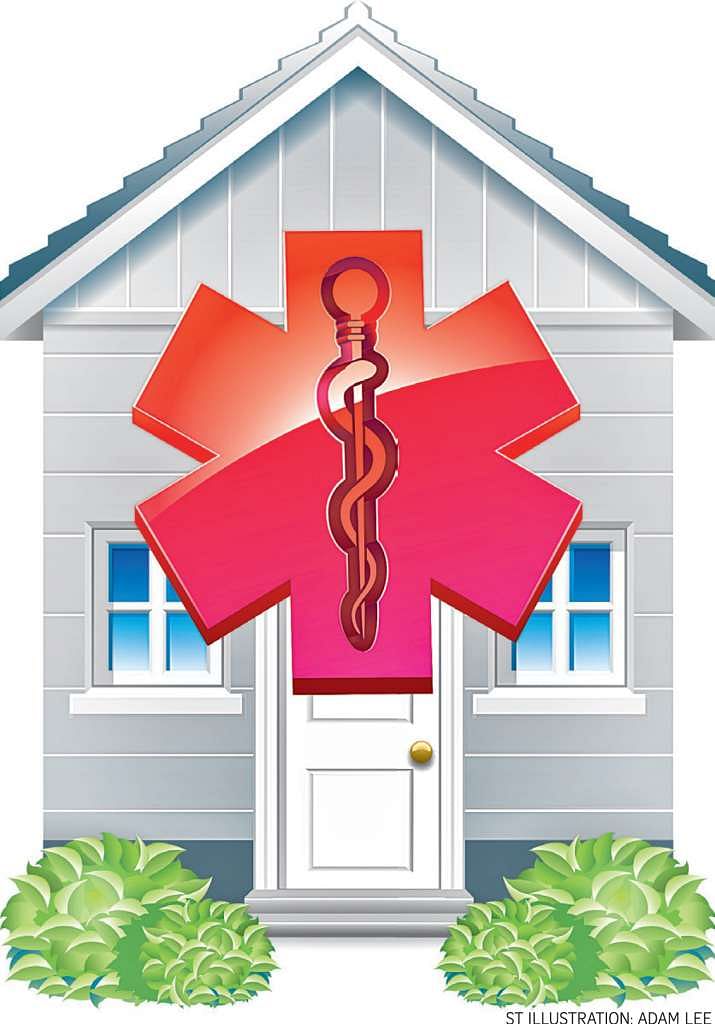It was a proud moment for Madam M when she visited my clinic recently. She has lymphoma - cancer of the lymph nodes.
My colleagues and I have been taking care of her in the past year.
The toils of chemotherapy on her body had led to her being frequently admitted to hospital during her treatment.
As she is frail and wheelchair- bound, clinic visits were stressful for her and her caregiver. We thus felt she would be an appropriate candidate for the department's transitional care programme.
Nurses from the programme visit patients' homes regularly to help with blood tests and training the caregiver. If necessary, doctors may review patients at their homes.
Madam M's unscheduled emergency visits soon decreased and they eventually tapered off.

Eight months on, she has regained weight and strength, and is ready to "graduate" from the programme.
In recent years, there has been a paradigm shift from hospital-based care to transitional and home-based services in the public healthcare system here. It has prompted acute care hospitals to develop programmes that extend care from the hospital into the community.
Such initiatives were targeted at the ageing population and those with chronic health issues such as stroke or heart problems.
Increasingly, however, there is a growing realisation that such community-based models are also highly relevant for cancer patients and their caregivers during the recovery process.
Cancer is a devastating diagnosis affecting not just patients, but also their loved ones. Apart from the psychological stress and emotional turmoil, they have to deal with the demands of cancer treatment, which is often intensive and time-consuming.
As Madam T, an acute leukaemia patient, puts it so poignantly: "The cancer diagnosis makes me realise I have limited time, and yet, I seem to be spending so much of this valuable time waiting in the clinic."
While home-based palliative care services are well-established here, home-based services for patients receiving active cancer treatment are less so.
Physicians are used to the idea of asking patients to visit the hospital for reviews, even when acute care is not required.
However, if one were to consider the time patients spend on travelling and waiting, it seems that home-based care programmes would be more appropriate.
SMOOTH TRANSITION BACK HOME
The National University Cancer Institute, Singapore (NCIS) has been working to improve its home-based cancer care model since 2014.
Led by oncology-trained nurses, the programme initially aimed to help patients make a seamless transition from the hospital back home. It has since evolved from routine home visits and telephone support to include blood sample collection and the scheduling of transfusions.
Nurses can also do procedures such as cleaning of urinary catheters and drainage tubes at the patients' homes. Such measures have helped to reduce the frequency of clinic visits.
In recent years, the NCIS took another significant step forward. Erasing the age-old practice of providing cancer therapy only in hospital, a home chemotherapy programme was launched in December 2013 for 285 patients.
Under this scheme, patients being treated with selected drugs that are stable and have few side effects can have the medication administered at home.
One such drug is Bortezomib, a treatment for myeloma, a cancer of the bone marrow. The experience of delivering it at patients' homes has been encouraging, mirroring the benefits shown in similar initiatives in Europe.
FEWER DISRUPTIONS
An effective homecare programme should result in fewer emergency visits and unexpected hospitalisation for patients.
Other benefits include an improvement in patients' comfort level and quality of life, and fewer disruptions to the caregivers' lives.
Medical staff would be able to better identify with patients' needs through caring for them at home.
Moving forward, concerted efforts from hospital medical teams, as well as governmental support, are crucial to ensure that homecare programmes remain relevant in the years ahead.
For instance, the skills of medical staff need to be continually improved to fit patients' needs. Better identification of suitable patients is another area, as is collaborating with the Government on healthcare financing to keep home care affordable.
Only through such efforts can we ensure that patients like Madam M and Madam T will be able to receive good cancer treatment, while surrounded by loved ones at home.
This would motivate them to stick to the prescribed treatments even when the journey gets tough. After all, as the adage goes, "Home is where the heart is."
•Dr Michelle Poon is a senior consultant at the department of haematology-oncology at the National University Cancer Institute, Singapore.
